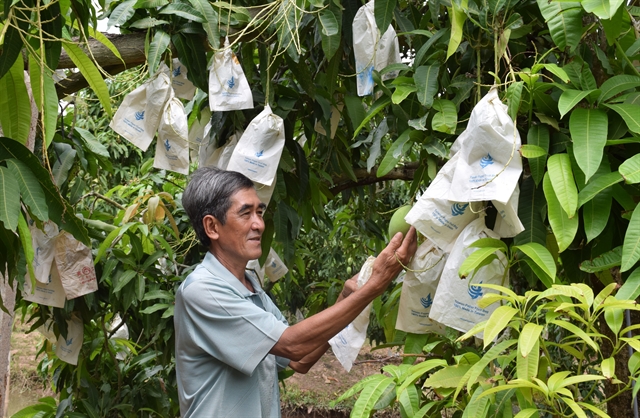 Society
Society

Đồng Tháp Province, the Cửu Long (Mekong) Delta’s largest mango producer, plans to increase the area under the fruit to 10,000ha next year, a top agriculture official has said.

|
| A mango orchard in Đồng Tháp Province’s Cao Lãnh District. – VNA/VNS Photo Chương Đài |
ĐỒNG THÁP – Đồng Tháp Province, the Cửu Long (Mekong) Delta’s largest mango producer, plans to increase the area under the fruit to 10,000ha next year, a top agriculture official has said.
Nguyễn Phước Thiện, deputy director of the Department of Agriculture and Rural Development, said it would also invest in infrastructure for concentrated mango-growing areas and developing its mango brand at home and abroad.
The province has 9,664ha of mango orchards, mostly in Cao Lãnh, Lấp Vò and Thanh Bình districts and Cao Lãnh and Sa Đéc cities, 18 per cent of the delta’s total.
Cát Chu and Hòa Lộc mangoes are its two major varieties, with the former accounting for 60 per cent of the mango-growing area and the latter for 30 per cent.
Thiện said the province has an average yield of 11 tonnes per hectare per year.
Cát Chu offers profits of VNĐ115 million (US$5,000) per hectare per year and Hòa Lộc, VNĐ200 million ($8,600), he said.
More and more farmers are using advanced techniques to improve yield and quality. Those who grow Cát Chu and Hòa Lộc now use bags to cover young mangoes to protect them from pests. This method also helps reduce the use of pesticides, gives the fruits an attractive appearance and increases yields by 20-30 per cent.
More than 6,300ha of orchards now fruit in the off-season, when farmers can get VNĐ10,000 per kilogramme more than during the main season.
Đoàn Thanh Hiền, a member of the Mỹ Xương Mango Cooperative in Cao Lãnh District, was one of the province’s first farmers to adopt good agricultural practices (GAP) standards to grow mangoes in the off-season.
The main harvest season is April-May.
The province has focused on GAP in recent years and now has mangoes grown to VietGAP quality on 181ha and GlobalGAP quality on 42ha.
It exports the fruit to a number of markets, including the US and Australia.
It has helped its four mango co-operatives and 37 co-operative groups link up with companies in HCM City and Hà Nội to export the fruit to South Korea, Japan, New Zealand, Russia and China.
Mango is one of the five key agricultural produce in Đồng Tháp’s agricultural restructuring plan for the period up to 2020.
It targets output of 125,000 tonnes worth VNĐ1.9 trillion ($81.9 million) this year, up VNĐ269 billion from last year, according to the department. – VNS




